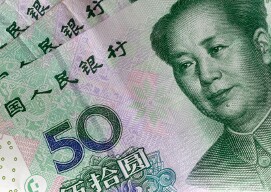
The Chinese yuan is hovering around its lowest level since May 2017 on Wednesday as the equities market plunged, US-China trade tensions escalated, and investors continued to sell off their yuan holdings this week. Is this a sign that the worst may be behind the currency? These are factors that may already be priced in the yuan, capping its rapid descent.
The Hang Seng China Enterprises Index slipped 2%, the MSCIâs emerging-market benchmark shed 1.3%, Shanghaiâs benchmark stock gauge, fell 2%, and the small-cap ChiNext plunged 2%. China had been able to withstand the international stock market volatility, especially in the wake of Turkeyâs economic collapse. There have been widespread fears that the nationâs financial crisis might seep into other pockets of the global economy and financial markets.
Traders are still paying attention to the US-China trade spat that does not appear to be settling down anytime soon. The US government continues to slap tariffs on Chinese exports, while Beijing has promised to retaliate to every import levy.
And this is having an incredible impact on the national economy. This week, new data found that retail sales slowed in July, fixed-asset investment rose at the slowest pace on record, and factory output failed to beat the market forecast of 6.3%. This comes as the Chinese economy expanded 6.7% in the second quarter, down from 6.8% in the first quarter.
As a result of the tepid economic data, the federal government has vowed to introduce stimulus efforts, such as easing credit, spending more on infrastructure, and preventing financial troubles from popping up across the economy. The Peopleâs Bank of China (PBOC), meanwhile, will introduce tools to stabilize the currency, but it confirmed that it will not use the yuan to gain leverage in the trade spat with the US.
The Chinese yuan is expected to be under pressure for the next few months, but much of what has been occurring â trade war, sluggish economic growth, and Turkeyâs economic demise â are gradually being priced in by the market. Plus, China is attracting a lot of foreign attention, primarily because bonds are considered risk-free and investors are picking up cheap stocks.
The USD/CNY currency pair surged 0.74% to 6.9348, from an opening of 6.8841, at 16:58 GMT on Wednesday. The EUR/CNY is also gaining, tacking on 0.76% to 7.8686, from an opening of 7.8105.
If you have any questions, comments or opinions regarding the Chinese Yuan,
feel free to post them using the commentary form below.